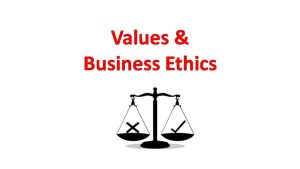Business Values and Ethics: Foundation for Sustainable Success
Business values and ethics encompass the principles, standards, and moral philosophies that guide the behavior and decision-making processes within a business. These values form the bedrock upon which a company’s culture, policies, and interactions with stakeholders are built. Ethics in business involve applying moral principles to situations that arise in a business environment, ensuring that actions taken by businesses are not only legally compliant but also morally sound.
Importance of Business Values and Ethics
The importance of business values and ethics cannot be overstated. They serve as a compass for organizational behavior, influencing everything from internal management practices to external interactions with customers, suppliers, and the broader community. Ethical business practices are crucial for building trust, reputation, and long-term success. They help prevent legal issues, enhance brand image, and foster a positive work environment. In an era where consumers and employees alike are increasingly valuing corporate responsibility and ethical behavior, businesses that prioritize these principles can gain a competitive edge.
Overview of Key Concepts
Understanding business values and ethics involves exploring several key concepts, including integrity, fairness, accountability, and respect. These concepts form the foundation of ethical behavior in business and are essential for fostering an environment where ethical decision-making is the norm. By adhering to these principles, businesses can create a culture that promotes ethical behavior at all levels, from top management to entry-level employees.
Historical Context
Evolution of Business Ethics
Business ethics have evolved significantly over time, influenced by societal changes, legal developments, and shifts in cultural attitudes. In the early days of commerce, ethical considerations were often secondary to profit. However, as businesses grew and their impact on society became more pronounced, the need for ethical guidelines became apparent. The Industrial Revolution, in particular, highlighted the negative consequences of unethical business practices, leading to the development of labor laws and corporate regulations.
Influences of Different Eras
Different eras have shaped business ethics in unique ways. The early 20th century saw the rise of corporate social responsibility, as businesses began to recognize their broader impact on society. The 1960s and 1970s brought about significant changes with the civil rights movement, environmental awareness, and increased consumer advocacy, all of which pushed businesses to adopt more ethical practices. The late 20th and early 21st centuries have seen a focus on globalization and technology, raising new ethical challenges and considerations.
Landmark Cases and Their Impact
Several landmark cases have played a pivotal role in shaping business ethics. The Enron scandal of 2001, for example, highlighted the dangers of unethical accounting practices and led to significant regulatory changes, including the Sarbanes-Oxley Act. Similarly, the 2008 financial crisis underscored the importance of ethical behavior in the financial industry, prompting stricter regulations and a renewed focus on ethical standards in business.
Core Principles
Fairness and Justice
Fairness and justice involve treating all stakeholders equitably and making decisions that are impartial and just. This includes ensuring fair treatment of employees, fair pricing for customers, and fair competition in the market. Upholding these principles helps create a level playing field and fosters trust and loyalty.
Accountability and Responsibility
Accountability and responsibility mean being answerable for one’s actions and decisions. Businesses must take responsibility for their impact on society and the environment and be accountable to their stakeholders. This includes not only legal accountability but also moral responsibility.
Respect and Dignity
Respect and dignity involve treating all individuals with respect and valuing their inherent worth. This principle is essential for creating a positive and inclusive workplace environment and for building strong, respectful relationships with customers, suppliers, and the broader community.
Ethical Theories in Business
Utilitarianism
Utilitarianism is an ethical theory that focuses on the consequences of actions, aiming to maximize overall happiness and minimize harm. In a business context, this means making decisions that benefit the greatest number of people, even if it involves some sacrifices.
Deontology
Deontology is an ethical theory that emphasizes duties and rules. According to deontological principles, actions are considered ethical if they adhere to established rules and duties, regardless of the consequences. In business, this means following ethical guidelines and principles consistently.
Virtue Ethics
Virtue ethics focuses on the character and virtues of individuals rather than specific actions. It emphasizes developing good character traits, such as honesty, courage, and compassion. In business, this means fostering a corporate culture that promotes virtuous behavior among employees and leaders.
Relativism
Relativism is the belief that ethical standards are not absolute but vary depending on context and culture. In a business context, this means understanding and respecting the ethical norms and values of different cultures and adapting business practices accordingly.
Developing Business Values
Role of Leadership
Leadership plays a critical role in developing and promoting business values. Leaders set the tone for ethical behavior and serve as role models for employees. By demonstrating a commitment to ethical principles, leaders can inspire others to follow suit.
Establishing Core Values
Establishing core values involves identifying the fundamental principles that guide a business’s behavior and decision-making. These values should be clearly articulated, widely communicated, and consistently upheld.
Communication and Implementation
Effective communication and implementation are essential for embedding business values into the organizational culture. This involves regularly communicating the importance of these values to employees, providing training and resources, and integrating them into all aspects of the business.
Ethical Decision Making
Frameworks for Ethical Decision Making
Frameworks for ethical decision-making provide structured approaches to resolving ethical dilemmas. These frameworks often involve identifying the ethical issues, evaluating the potential consequences, considering the impact on stakeholders, and choosing the most ethical course of action.
Case Studies and Applications
Real-world case studies can provide valuable insights into ethical decision-making. By examining how other businesses have navigated ethical challenges, companies can learn from their successes and mistakes.
Overcoming Ethical Dilemmas
Overcoming ethical dilemmas requires a clear understanding of ethical principles and a commitment to doing what is right. This often involves difficult choices and the courage to stand by one’s values, even in the face of opposition.
Corporate Social Responsibility (CSR)
Definition and Importance
Corporate Social Responsibility (CSR) refers to the efforts businesses make to contribute positively to society and the environment. This includes initiatives related to sustainability, philanthropy, and ethical labor practices. CSR is important because it demonstrates a company’s commitment to ethical principles and helps build trust with stakeholders.
CSR Strategies
Effective CSR strategies involve identifying key areas where the business can make a positive impact, setting measurable goals, and implementing initiatives to achieve these goals. This can include reducing environmental impact, supporting community projects, and promoting fair labor practices.
Benefits of CSR
CSR offers numerous benefits, including enhanced brand reputation, increased customer loyalty, and improved employee engagement. By demonstrating a commitment to ethical practices and social responsibility, businesses can differentiate themselves from competitors and build stronger relationships with stakeholders.
Ethical Challenges in Business
Conflicts of Interest
Conflicts of interest occur when personal interests interfere with professional duties. Managing conflicts of interest involves implementing policies and procedures to identify, disclose, and mitigate potential conflicts to ensure decisions are made in the best interest of the business and its stakeholders.
Whistleblowing
Whistleblowing involves reporting unethical or illegal activities within an organization. Protecting whistleblowers and encouraging a culture of transparency are crucial for maintaining ethical standards. Companies should have clear policies and procedures in place to handle whistleblowing, ensuring that employees feel safe to report wrongdoing without fear of retaliation. Encouraging an open and honest work environment where employees can speak up helps identify and address ethical issues promptly.
Corporate Governance
Good corporate governance ensures that businesses operate transparently and ethically, balancing the interests of various stakeholders, including shareholders, management, customers, suppliers, financiers, government, and the community. Key elements of good corporate governance include a strong and independent board of directors, robust internal controls, transparency, and accountability. Effective governance helps prevent unethical practices, reduces risks, and enhances corporate reputation.
Codes of Ethics
Purpose and Importance
A code of ethics is a formal document that outlines an organization’s values, principles, and standards of conduct. Its purpose is to provide a clear framework for ethical decision-making and behavior. A well-defined code of ethics helps employees understand what is expected of them, promotes consistency in behavior, and serves as a reference point for addressing ethical dilemmas. It is crucial for establishing a culture of integrity and accountability within the organization.
Creating a Code of Ethics
Creating a code of ethics involves several steps:
1. Identify Core Values: Determine the fundamental values that will guide the organization’s behavior.
2. Engage Stakeholders: Involve employees, management, and other stakeholders in the development process to ensure the code reflects the collective values and concerns.
3. Draft the Code: Clearly articulate the values, principles, and expected behaviors. Use straightforward language to ensure accessibility and understanding.
4. Review and Revise: Seek feedback on the draft from various stakeholders and revise accordingly.
5. Implement and Communicate: Roll out the code of ethics through training sessions, internal communications, and integration into business processes.
6. Enforce and Monitor: Establish mechanisms for enforcement, including reporting systems and disciplinary procedures for violations. Regularly review and update the code to keep it relevant.
Ethics in Different Business Areas
Marketing Ethics
Marketing ethics involve principles and standards that guide the conduct of advertising, promotions, and sales. Ethical marketing practices ensure that businesses communicate honestly with customers, avoid misleading claims, respect customer privacy, and promote products responsibly. Key issues in marketing ethics include truth in advertising, transparency, and the impact of marketing on vulnerable populations.
Financial Ethics
Financial ethics pertain to the ethical issues that arise in the financial sector, including banking, accounting, and investing. Ethical financial practices include accurate financial reporting, transparency in financial transactions, responsible lending, and investment practices that avoid conflicts of interest. Ensuring ethical behavior in finance is crucial for maintaining investor confidence and market integrity.
Human Resource Ethics
Human resource ethics involve fair and respectful treatment of employees. This includes ensuring non-discriminatory hiring practices, providing fair compensation, ensuring safe working conditions, and respecting employee rights. Ethical HR practices promote a positive workplace culture, enhance employee satisfaction, and reduce the risk of legal issues.
IT and Data Ethics
IT and data ethics address the ethical issues related to the use of technology and data. This includes data privacy, cybersecurity, ethical use of artificial intelligence, and ensuring that technology is accessible and does not harm users. Businesses must navigate these issues carefully to protect sensitive information, comply with regulations, and build trust with users.
Global Perspectives
Cross-Cultural Ethical Issues
Operating in a global marketplace presents unique ethical challenges due to cultural differences. Cross-cultural ethical issues arise when business practices that are acceptable in one culture may be considered unethical in another. Businesses must be aware of these differences and adapt their practices to respect local customs and values while maintaining their ethical standards.
International Business Ethics
International business ethics involves understanding and adhering to ethical standards in a global context. This includes compliance with international laws and regulations, respecting human rights, and ensuring fair labor practices. Businesses must navigate complex regulatory environments and ethical standards to operate responsibly across borders.
Global Standards and Regulations
Various international organizations set standards and regulations to promote ethical business practices globally. Examples include the United Nations Global Compact, which provides principles for human rights, labor, environment, and anti-corruption, and the OECD Guidelines for Multinational Enterprises, which offer recommendations for responsible business conduct.
Conclusion
Summary of Key Points
Business values and ethics are foundational to sustainable success. They guide behavior, decision-making, and interactions with stakeholders, helping businesses build trust, reputation, and long-term success. Key concepts such as integrity, fairness, accountability, and respect are essential for fostering an ethical culture.
The Ongoing Importance of Business Values and Ethics
As the business environment becomes more complex and interconnected, the importance of business values and ethics will only grow. Companies that prioritize ethical behavior will be better positioned to navigate challenges, build strong relationships with stakeholders, and achieve sustainable success.
Call to Action for Businesses and Leaders
Businesses and leaders must commit to ethical practices, establish clear values, and create cultures that promote integrity and responsibility. By doing so, they can contribute to a more ethical and sustainable business landscape, benefiting not only their organizations but also society as a whole.









